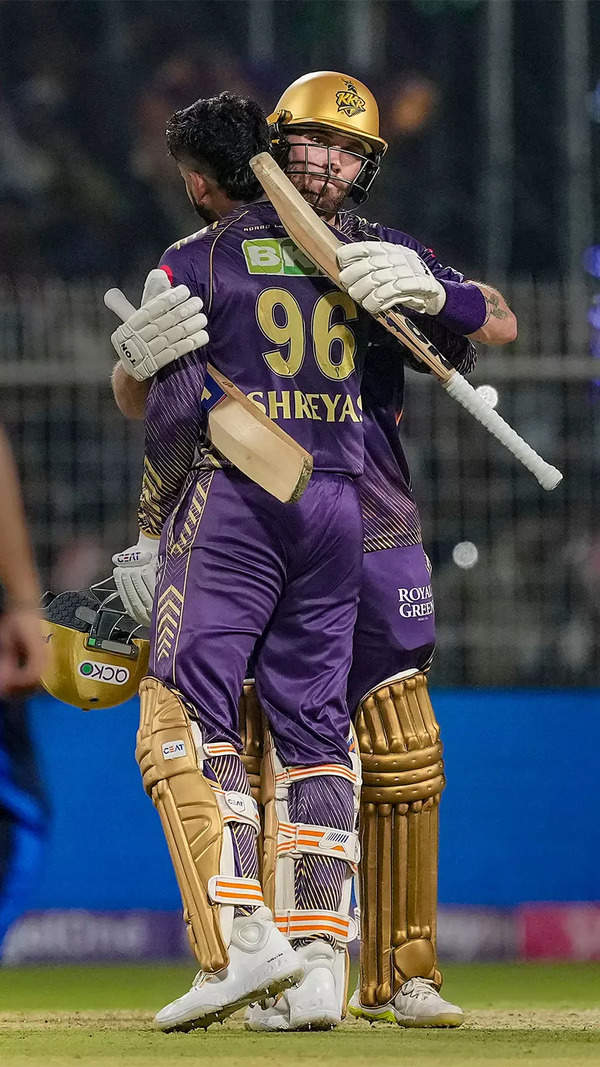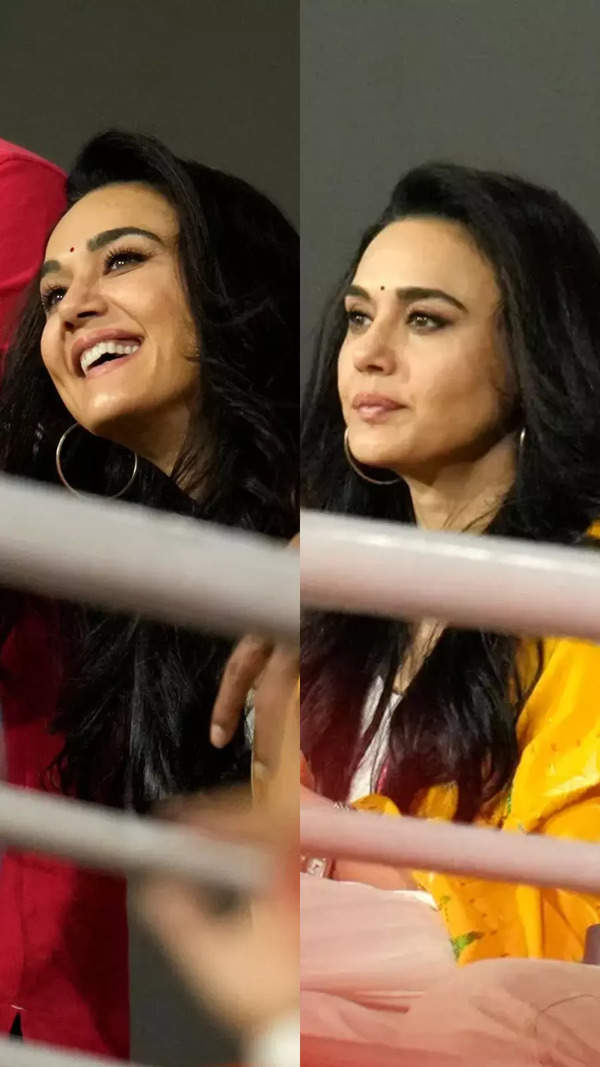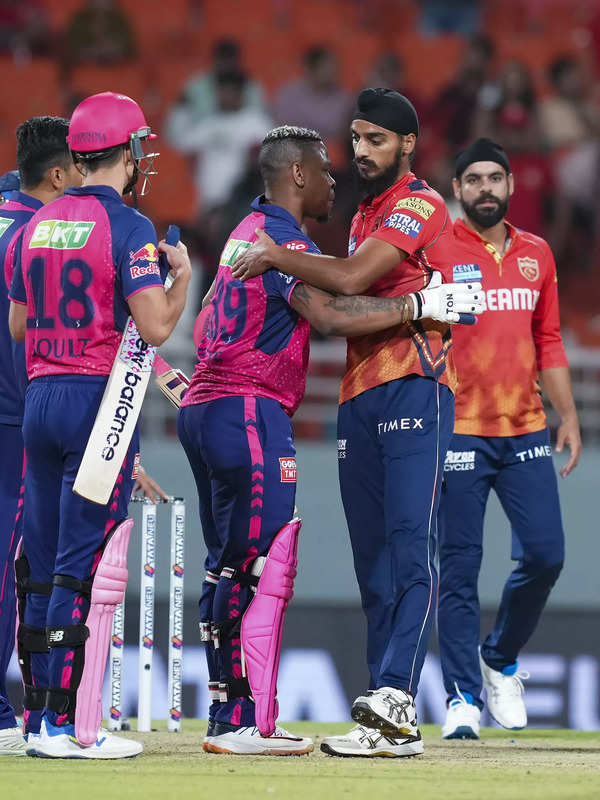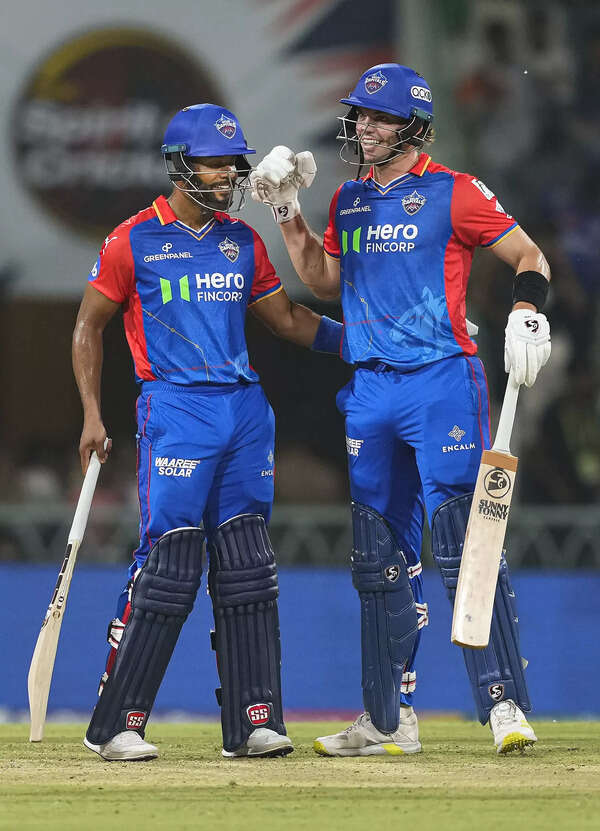- News
- Sports News
- What Indian wrestling needs next. Bajrang Punia's coach Shako Bentinidis explains
Trending
This story is from September 24, 2018
What Indian wrestling needs next. Bajrang Punia's coach Shako Bentinidis explains
Bentinidis, a three-time Olympian, is Punia's personal coach. Since the two joined hands in February this year, Bajrang has managed to win the 65kg freestyle gold at the Commonwealth Games and Asian Games, besides continuing his winning run at international events between the two big triumphs.
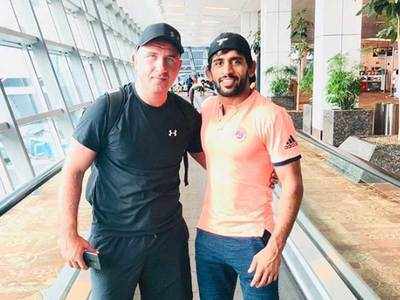
Bajrang Punia with coach Shako Bentinidis (Instagram Photo)
Key Highlights
- Bajrang Punia appointed Shako as his personal coach in February this year
- Shako, a three time Olympian, is from Georgia
- Bajrang won CWG and Asiad gold this year in 65kg Freestyle wrestling
GOHANA (Haryana): The stage was chock-a-block. It was a 30x30 feet elevated podium of wooden tables in the middle of a pandaal. The fluttering white-cloth roof was in striking contrast to the dark, overcast skies above it. The front-row had all the dignitaries, behind them were mainly turbaned taus - most of them natives of villages in the Sonipat district.On either side of the stage were people, and more people, trying to fit into the cameraman's frame. Breaking that crowd with his outstretched arms appeared a man from the left corner. He was making way for a distinct figure walking behind him. Wearing a white T-shirt tucked neatly into his pants emerged a frame looking fit as a fiddle. The camera panned to those two men moving in, trying to find space on one of the sofas. A seat was finally found for Shako Bentinidis -- the Georgian playing a pivotal role in Bajrang Punia's golden run on the wrestling mat.
At Olympic bronze medallist Yogeshwar Dutt's academy, inside Bhagwan Parshuram College of Education, a function was underway to felicitate Punia for his Asian Games gold. And Bhai Saab, as Olympic medallist Dutt is addressed by people around him, was evidently happy to let his prodigy bask in the limelight. "Bas aapka aashirwaad hai (it's a result of your blessings)," was his response to unending congratulatory greetings.
On stage, Bajrang was being loaded with garlands made of currency notes as the announcer made sure he mentioned exactly how much each garland was worth and who presented it. Meanwhile, Bentinidis, with marigold flowers around his neck, had taken shelter at the edge of the podium. Rain water had squeezed through the wet cloth roof as this reporter said "hello" to Bentinidis and then asked: "Can we have a chat?" He looked but didn't reply, just extended his hand to pull the reporter up on stage. "Sure now," he said.
Bentinidis, a three-time Olympian, is Punia's personal coach. Since the two joined hands in February this year, Bajrang has managed to win the 65kg freestyle gold at the Commonwealth Games and Asian Games, besides continuing his winning run at international events between the two big triumphs.
Do you feel proud after seeing so much adulation for your student?
Definitely. I have been working with Bajrang for only five months. It's a very small time span. He has shown very good concentration in training and he is psychologically very strong as well. He is ready to win gold in every competition from here on. Against the level of Bajrang's concentration for six minutes (in a match), it's very difficult to get past him. The best thing about Bajrang is he is ready to accept change. We have formed a team together, which is very important.
You mentioned the word 'change'. Can you elaborate on that?
I have changed Bajrang's training regime in terms of routine, psychology, technique, concentration. Every little change is important to win gold in big competitions. For example, if you don't get enough sleep or the right diet, there's no chance (to excel).
Does that mean Indian wrestlers are not following the right training module?
Indian wrestling has very talented athletes, but coaches, weather and food are the problem areas. There is only strength training, not much focus on technique. That's one big problem. India can be in top five wrestling nations, 100 percent, but they need to change their training in terms of technique.
And (training) partners also. Many top competitions in India happen in the form of dangal. Dangal and freestyle wrestling can't be compared. To make that transition is very difficult. Dangal may make them physically strong but it doesn't teach them technique that is required to succeed and become a quality wrestler. This is a very big problem.
So basically what Indian wrestling lacks according to you is technical training?
The whole system needs to change. Another big problem is scheduling. In every academy here in India, they start training at around 7 in the morning. It's not good. Your organs are still not fully active or awake early in the morning. It's not possible to put in your best on the mat if you start early. World over, wrestlers begin training at around 11 in the morning. By 10 may be, everything inside you is ready to train.
Bajrang's next big tournament is the World Championships next month. How important you think it is to win a gold there?
It's not important what colour medal he wins in Budapest. What's important is that he should be ready in one-and-a-half years' time for the Olympics.
At Olympic bronze medallist Yogeshwar Dutt's academy, inside Bhagwan Parshuram College of Education, a function was underway to felicitate Punia for his Asian Games gold. And Bhai Saab, as Olympic medallist Dutt is addressed by people around him, was evidently happy to let his prodigy bask in the limelight. "Bas aapka aashirwaad hai (it's a result of your blessings)," was his response to unending congratulatory greetings.
On stage, Bajrang was being loaded with garlands made of currency notes as the announcer made sure he mentioned exactly how much each garland was worth and who presented it. Meanwhile, Bentinidis, with marigold flowers around his neck, had taken shelter at the edge of the podium. Rain water had squeezed through the wet cloth roof as this reporter said "hello" to Bentinidis and then asked: "Can we have a chat?" He looked but didn't reply, just extended his hand to pull the reporter up on stage. "Sure now," he said.
Bentinidis, a three-time Olympian, is Punia's personal coach. Since the two joined hands in February this year, Bajrang has managed to win the 65kg freestyle gold at the Commonwealth Games and Asian Games, besides continuing his winning run at international events between the two big triumphs.
Something definitely has changed as far as Punia's career is concerned, besides the guidance of his childhood mentor Dutt. Though the leaking roof wasn't a perfect setting for an interview, Bentinidis agreed to give his time to TimesofIndia.com for this chat.
Do you feel proud after seeing so much adulation for your student?
Definitely. I have been working with Bajrang for only five months. It's a very small time span. He has shown very good concentration in training and he is psychologically very strong as well. He is ready to win gold in every competition from here on. Against the level of Bajrang's concentration for six minutes (in a match), it's very difficult to get past him. The best thing about Bajrang is he is ready to accept change. We have formed a team together, which is very important.
You mentioned the word 'change'. Can you elaborate on that?
I have changed Bajrang's training regime in terms of routine, psychology, technique, concentration. Every little change is important to win gold in big competitions. For example, if you don't get enough sleep or the right diet, there's no chance (to excel).
Does that mean Indian wrestlers are not following the right training module?
Indian wrestling has very talented athletes, but coaches, weather and food are the problem areas. There is only strength training, not much focus on technique. That's one big problem. India can be in top five wrestling nations, 100 percent, but they need to change their training in terms of technique.
And (training) partners also. Many top competitions in India happen in the form of dangal. Dangal and freestyle wrestling can't be compared. To make that transition is very difficult. Dangal may make them physically strong but it doesn't teach them technique that is required to succeed and become a quality wrestler. This is a very big problem.
So basically what Indian wrestling lacks according to you is technical training?
The whole system needs to change. Another big problem is scheduling. In every academy here in India, they start training at around 7 in the morning. It's not good. Your organs are still not fully active or awake early in the morning. It's not possible to put in your best on the mat if you start early. World over, wrestlers begin training at around 11 in the morning. By 10 may be, everything inside you is ready to train.
Bajrang's next big tournament is the World Championships next month. How important you think it is to win a gold there?
It's not important what colour medal he wins in Budapest. What's important is that he should be ready in one-and-a-half years' time for the Olympics.
End of Article
FOLLOW US ON SOCIAL MEDIA






